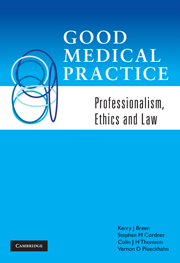Book contents
- Frontmatter
- Foreword
- Contents
- List of tables
- Preface
- Preface to the 1997 edition
- Acknowledgments
- About the authors
- Table of cases
- Table of statutes
- 1 Ethical principles for the medical profession
- 2 Ethical and legal responsibilities of medical students
- 3 Communication skills
- 4 Consent and informed decision making
- 5 Confidentiality, privacy and disclosure
- 6 Medical records, reports and certificates
- 7 Negligence, professional liability and adverse events
- 8 The regulation of the medical profession
- 9 Health care complaints systems
- 10 The doctor and sexual boundaries
- 11 Personal health of the doctor: illness and impairment
- 12 Maintenance of professional competence
- 13 Ethics and the allocation of health-care resources
- 14 The Australian health-care system
- 15 The doctor and interprofessional relationships
- 16 Entering and leaving practice and practice management
- 17 Clinical research
- 18 Prescribing and administering drugs
- 19 Diagnosing and certifying death and the role of the coroner
- 20 Births, reproductive technology, family law and child protection
- 21 Termination of pregnancy and related issues
- 22 Withholding or withdrawing treatment in the seriously or terminally ill
- 23 The law and the mentally ill
- 24 The law and courts of law in Australia
- 25 Medico-legal examinations and reports, court procedures and expert evidence
- 26 Other legislation relevant to medical practice
- APPENDIX 1 AMA CODE OF ETHICS – 2004
- Index
- References
5 - Confidentiality, privacy and disclosure
- Frontmatter
- Foreword
- Contents
- List of tables
- Preface
- Preface to the 1997 edition
- Acknowledgments
- About the authors
- Table of cases
- Table of statutes
- 1 Ethical principles for the medical profession
- 2 Ethical and legal responsibilities of medical students
- 3 Communication skills
- 4 Consent and informed decision making
- 5 Confidentiality, privacy and disclosure
- 6 Medical records, reports and certificates
- 7 Negligence, professional liability and adverse events
- 8 The regulation of the medical profession
- 9 Health care complaints systems
- 10 The doctor and sexual boundaries
- 11 Personal health of the doctor: illness and impairment
- 12 Maintenance of professional competence
- 13 Ethics and the allocation of health-care resources
- 14 The Australian health-care system
- 15 The doctor and interprofessional relationships
- 16 Entering and leaving practice and practice management
- 17 Clinical research
- 18 Prescribing and administering drugs
- 19 Diagnosing and certifying death and the role of the coroner
- 20 Births, reproductive technology, family law and child protection
- 21 Termination of pregnancy and related issues
- 22 Withholding or withdrawing treatment in the seriously or terminally ill
- 23 The law and the mentally ill
- 24 The law and courts of law in Australia
- 25 Medico-legal examinations and reports, court procedures and expert evidence
- 26 Other legislation relevant to medical practice
- APPENDIX 1 AMA CODE OF ETHICS – 2004
- Index
- References
Summary
Fundamental to a proper doctor–patient relationship is the assurance that information provided by the patient to the treating doctor will remain strictly confidential. Doctors must be free to ask their patients any questions necessary for diagnosis and treatment, and patients must be willing to trust doctors by giving full answers. Maintaining such trust has a wider social benefit of ensuring that medical practice serves to promote and maintain the health of the community. The basis of this trust lies in one of the oldest ethical principles of medical practice stated in the Hippocratic Oath as:
whatsoever I shall see or hear in the course of my profession in my intercourse with men, if it be what should not be published abroad, I will never divulge, holding such things to be holy secrets.
This same obligation has since been repeated in the World Medical Association Declaration of Geneva as ‘I will respect the secrets confided in me, even after the patient has died’.
This ethical requirement for confidentiality, well understood by doctors, has been overlaid in Australia in recent years by the progressive introduction of privacy legislation at the federal level and in some states, which for doctors covers very much the same territory as this ethical requirement. As a result, doctors now need to understand the ethical and legal bases of their professional obligations in this regard. In this chapter, both bases are described and explained.
- Type
- Chapter
- Information
- Good Medical PracticeProfessionalism, Ethics and Law, pp. 69 - 86Publisher: Cambridge University PressPrint publication year: 2010



